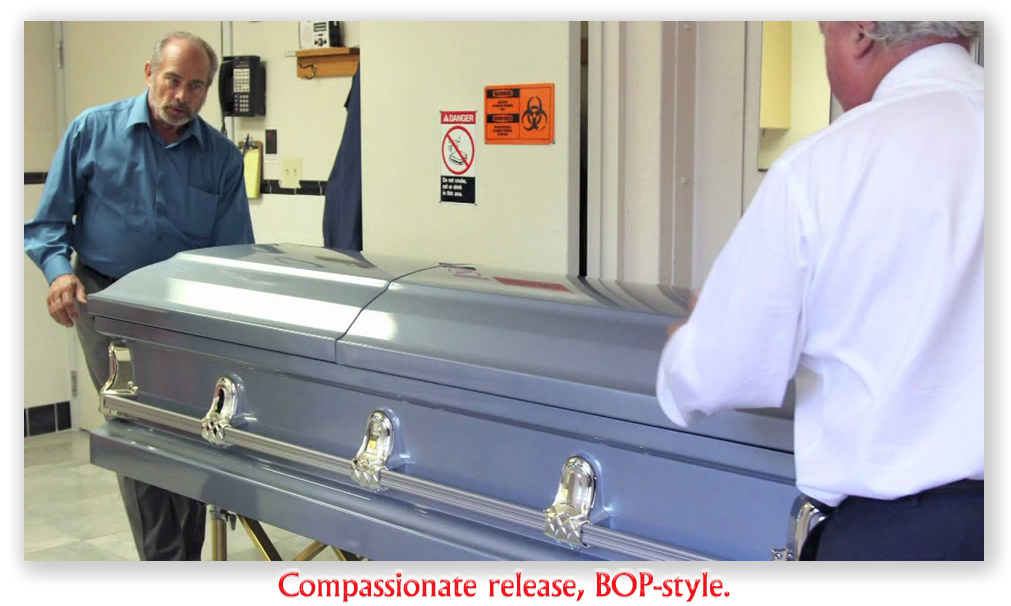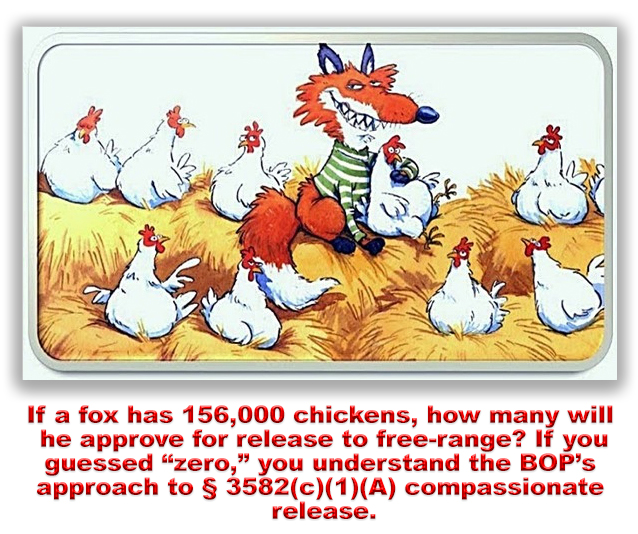We post news and comment on federal criminal justice issues, focused primarily on trial and post-conviction matters, legislative initiatives, and sentencing issues.

2ND CIRCUIT REINVENTS COMPASSIONATE RELEASE TO UNLEASH JUDGES’ DISCRETION
The government has been fighting 18 U.S.C. § 3582(c)(1)(A) compassionate release motions hammer and tong ever since inmates won the right to file such motions themselves in the First Step Act. (Before that, only the BOP could file such a compassionate release motion, and – unsurprisingly – the BOP had little interest in doing so, but that’s another story).
 A great example of government hard-heartedness: Reason magazine reported last week that the U.S. Attorney in Miami “unsuccessfully tried to argue that an 80-year-old inmate serving a life sentence for marijuana offenses shouldn’t be released because COVID-19 is just ‘one more way to perish in prison’.”
A great example of government hard-heartedness: Reason magazine reported last week that the U.S. Attorney in Miami “unsuccessfully tried to argue that an 80-year-old inmate serving a life sentence for marijuana offenses shouldn’t be released because COVID-19 is just ‘one more way to perish in prison’.”
U.S. District Judge Donald Graham disagreed, granting compassionate release to an inmate – who was 27 years into his life sentence – and was wheelchair-bound by arthritis and heart disease. Reason cited the Miami case as an illustration of its point that while the Attorney General has urged the BOP to use compassionate release, home confinement, and other measures to get elderly and at-risk inmates out of federal prison, “the rollout of Barr’s directive has been maddeningly inconsistent…”
Reason quoted FAMM president Kevin Ring as saying, “Title 9 of the U.S. Attorney’s Manual governs criminal proceedings, and there is no provision there that requires you to be an asshole.”
 Not that that has stopped the government. One recurring government argument against compassionate release is that U.S.S.G. § 1B1.13 only lists four reasons for compassionate release. If you don’t fit into reasons (1) through (3) – and hardly anyone does – you have to rely on the fourth, which says, “As determined by the Director of the Bureau of Prisons, there exists in the defendant’s case an extraordinary and compelling reason other than, or in combination with, the reasons described” in the other three reasons.” The government has argued that for any reason other than an inmate’s terminal illness (such as having a COVID risk factor), a court cannot grant compassionate release unless the BOP has itself made the motion. “A sizable minority” of courts have agreed.
Not that that has stopped the government. One recurring government argument against compassionate release is that U.S.S.G. § 1B1.13 only lists four reasons for compassionate release. If you don’t fit into reasons (1) through (3) – and hardly anyone does – you have to rely on the fourth, which says, “As determined by the Director of the Bureau of Prisons, there exists in the defendant’s case an extraordinary and compelling reason other than, or in combination with, the reasons described” in the other three reasons.” The government has argued that for any reason other than an inmate’s terminal illness (such as having a COVID risk factor), a court cannot grant compassionate release unless the BOP has itself made the motion. “A sizable minority” of courts have agreed.
Last week, the 2nd Circuit drove a stake through the heart of that argument. Jeremy Zullo sought compassionate release. The court denied him, ruling that his reasons – sentence unfairness, rehabilitation and government violation of his plea agreement – had not been found to be “extraordinary and compelling” under 18 U.S.C. § 3582 by the director of the BOP, and thus could not support a sentence reduction.
The Circuit reversed, holding that § 1B1.13 does not apply to post-First Step sentence reduction motions:
Application Note 4 says that ‘[a] reduction under this policy statement may be granted only upon motion by the Director of the Bureau of Prisons pursuant to 18 U.S.C. § 3582(c)(1)(A). And we conclude that after the First Step Act, this language must be read not as a description of the former statute’s requirements, but as defining the motions to which the policy statement applies. A sentence reduction brought about not ‘upon motion by the Director of the Bureau of Prisons”’ is not a reduction ‘under this policy statement.’ In other words, if a compassionate release motion is not brought by the BOP Director, Guideline 1B1.13 does not, by its own terms, apply to it. Because Guideline 1B1.13 is not “applicable” to compassionate release motions brought by defendants, Application Note 1(D) cannot constrain district courts’ discretion to consider whether any reasons are extraordinary and compelling.
 This holding is nothing short of astounding, sweeping away much of the compassionate release jurisprudence that has been written in the last 20 months. It will likely open compassionate release motions to people who have compelling arguments, but not claims that can be pigeonholed into the four categories in U.S.S.G. § 1B1.13.
This holding is nothing short of astounding, sweeping away much of the compassionate release jurisprudence that has been written in the last 20 months. It will likely open compassionate release motions to people who have compelling arguments, but not claims that can be pigeonholed into the four categories in U.S.S.G. § 1B1.13.
Reason.com, Federal Prosecutors Argue COVID-19 Is Just ‘One More Way to Perish in Prison’ (Sept 25)
United States v. Brooker, Case No. 19-3218-CR, 2020 U.S. App. LEXIS 30605 (2d Cir. Sept 25, 2020)
– Thomas L. Root

